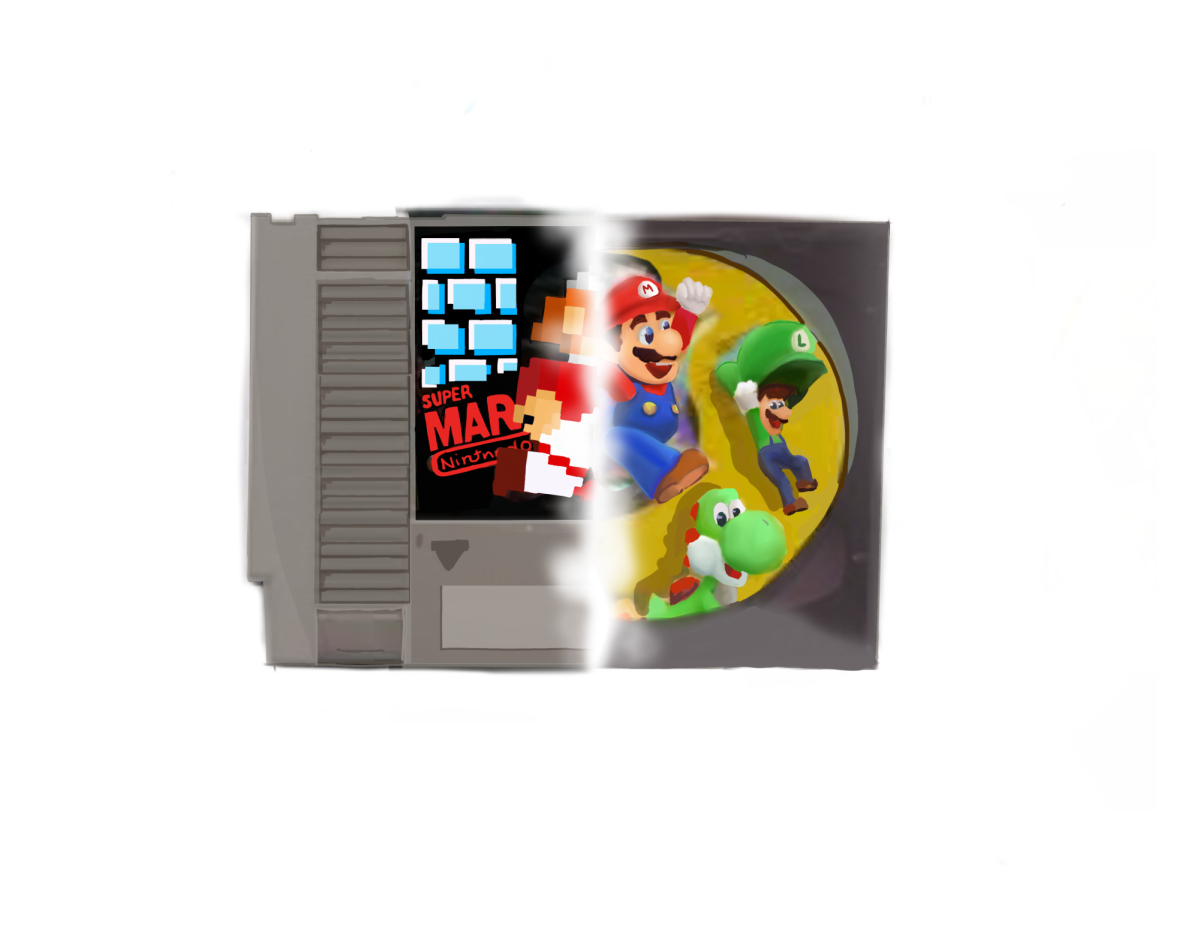Entertainment, and what constitutes it, is sort of like a rock in a raging river. This river is not of water, but of cultural change: aesthetics, philosophies, emotions and a myriad of other things; all pieces that shape the entertainment people choose to create and consume. As a result, pieces from different times can vary strongly in theme and mood, sometimes causing future generations to scratch their heads, trying to understand why their ancestors found them so compelling, and why the rock wore the way it did.
Video games, however, as a very new medium of entertainment, are especially impacted by a certain category of cultural change: the growth of technology. While the creation of more and more compact storage mediums most definitely impacted music and film, making it easier to carry and utilize the stored media, they were mainly direct upgrades that did not impact the piece itself much. For example, the sound on a cassette tape or compact disc containing the same song will be identical. The main difference between a compact disc containing “Modern Life is Rubbish” by Blur and a small folder of mp3 files of the same album is just the devices that can play the music.
Film works similarly; one can transfer the film to digital to experience it exactly as it was in an analog format. Literature is similarly timeless. As a matter of fact, I could transcribe all of “The Great Gatsby” by F. Scott Fitzgerald onto a pile of napkins, and after the initial hilarity of the scenario wears away, you would find yourself completely immersed in West Egg, just the same as if you had read a “proper” copy.
So, why are video games any different? The answer, ironically, is simple: video games are too complicated to be transferred around with full functionality. While you can take the data off of a Nintendo 64 cartridge and have it downloaded onto your computer, your computer can’t do anything with that data innately.
Brought to general terms, music, film and literature can all be moved between mediums with full functionality. Video games, however, are bound to whatever environment they were developed for. This potential for a game to become trapped in an outdated system is why video games are so uniquely impacted by the growth of technology.
If one decided that an old game should be playable on a new console, they would need to recreate all the features of the game in the desired environment. Moving a compact disc’s music onto a computer can take less than a minute. Moving an entire game to a new console can take years of development time, almost comparable to that of creating a brand new game. For this reason, games are usually only remade when they are well-loved or when people want them to be played.
So, remakes are used for preservation and renewal. They serve to bring beloved games to new audiences, or to give graphical and stylistic improvements to older games. A great example of this is “Persona 3 Reload,” released in 2024. The game was released for Playstation 4, Playstation 5, Xbox One, Xbox Series X and Steam. Steam is a platform used to purchase and play games on various computer operating systems. When compared to the original, “Persona 3,” which was released in 2006 for the PlayStation 2 and PlayStation Portable, it is obvious how “Persona 3 Reload” immediately succeeds in bringing the original game onto not only new PlayStation consoles, but a much wider spread of consoles as well. When one also considers that Steam can be used to purchase the title on most personal computers, a title that was once trapped on two outdated consoles is now available to a massively increased audience. Now, take into consideration that this remake overhauled the graphics and gameplay, all while maintaining the original game’s story and style, and it is by all means a successful remake. It checks every box.
So, when remakes like this are being made, one may ask why I would complain. Based on my current description, remakes seem like great ways to improve games, especially those who may find themselves trapped on decades-old consoles. I complain because remakes require a time and place. They require the need for preservation to be felt. If a game can be played on fairly recent consoles and does not have glaring issues that need correcting, perhaps a remake is uncalled for.
Take for instance “Marvel’s Spider-Man” for the PlayStation 4, released in 2018 by Insomniac Games. It was a well-received action game. The graphics were good, and, though not hyperrealistic, they were acceptable then and now. In 2020, however, a remastered version of the game was released, titled, “Marvel’s Spider-Man Remastered.” It had improved graphics, but the changeswere slight. The remaster was released for the PlayStation 4, PlayStation 5 and on Steam.
One consideration that should be made is that this release was a remaster and not a true remake. The difference is that a remake is a complete reconstruction of the game, while a remaster is meant to graphically improve the game. By definition, “Marvel’s Spider-Man Remastered” is just that.
So why mention it at all? The primary reason is that the release itself seems superfluous. The game was recent enough that the graphics themselves were, by all means, acceptable. The game was playable on the PlayStation 4, a modern system. The remaster did not even expand the consoles on which it could be played very much. The PlayStation 5 is already able to play games released for the PlayStation 4. Before the remaster was even released, you could take your copy of “Marvel’s Spider-Man” and play it on your PlayStation 5! The addition of the game to Steam added a wider audience, sure, but the impact is not nearly as broad as that of “Persona 3 Reload,” which expanded “Persona 3” to multiple consoles and Steam.
In fairness, “Marvel’s Spider-Man” was a title exclusive to PlayStation systems. It is to be expected that it would not be put on Xbox systems. The release of the remaster for Steam is what confuses me. Since the game did not gain any new players by adding a release for the PlayStation 5, the Steam release, despite the exclusivity to PlayStation, seems like a desperate attempt to make the remaster worth something. It is almost an admission of a jumped gun. Since the game was remastered too early, they may as well recoup the losses in development time with a Steam release.
Now, I’ve attacked Insomniac Games enough. The game development studio that was the true exigence of this entire article is Naughty Dog. Naughty Dog is a video game developer known for developing “The Last of Us,” a gritty, story-driven action adventure game set in a zombie apocalypse. The game received much praise for its story, and there was much excitement for the second part, released in 2020, as “The Last of Us Part II.”
Ignoring the negative reception of “The Last of Us Part II,” the series is the main culprit in this remake and remaster debacle. In 2014, only a year after the release of “The Last of Us,” a remaster titled, “The Last of Us Remastered” was released for the Playstation 4. It was a fairly recent remaster, but there is actually some validity to it, shockingly. The Playstation 4, unlike the Playstation 5, is unable to run the games of its predecessor. Since the Playstation 4 cannot run Playstation 3 games, making a new release for the latest console makes some sense.
The release of “The Last of Us Part II” is where things begin to get dicey. The second game is on Playstation 4, and so is the remaster of the first game. These versions of the games are, as previously mentioned, playable on the Playstation 5. So why? Why even bother releasing a remake of “The Last of Us” in 2020 titled “The Last of Us Part I?” Once again, the only discernible benefit is a Steam release. Otherwise, there is no need for it. The game is, for the most part, the same. Beside the graphical improvements, there is next to no purpose for the remake.
You may think that I am being dramatic. One remake for what was, at the time of the remake’s release, 9 years old, isn’t too horrible. And you would be right. If the “Last of Us” HBO series had not been announced in 2020.
Although it took until 2023 to premiere, “The Last of Us” HBO series is considered to be very faithful to the story of the games. So what do we have now? The original title, the remaster, the sequel, the remake and the show, which is almost a complete recreation of the games thus far.
But that’s not all. In 2024, “The Last of Us Part II Remastered” was released. The remaster didn’t even get a Steam release.
It must be very clear now that these remasters and releases are out of hand. How many different versions does this series need? Especially with a show that enters into a category of entertainment where remakes are not even required, what’s the point? Is it really a good use of time and energy to make so many rehashes of the same old thing over and over until you have new graphical improvements for every day of the week?
Remakes should be used to bring older, inaccessible titles back into the public eye with new features and a fresh coat of paint. Remasters should touch up more dated titles and similarly bring them back into the public’s focus.
The remake of “Resident Evil 2” released in 2020 by Capcom, for example, brought the game to newer consoles, from just the Playstation to Playstation 4, Playstation 5, Xbox One, Xbox Series X and Steam, and significantly overhauled the graphics, bringing the horror classic into the modern gaming scene in a way that may have been too dated or niche for most modern audiences if left alone.
If I hear that a game is being remade or remastered, it should be cause for excitement as something forgotten is brought back to the mainstream, not a signal for me to roll my eyes as Naughty Dog tries to get $60 from me for another identical “The Last of Us” remake.



